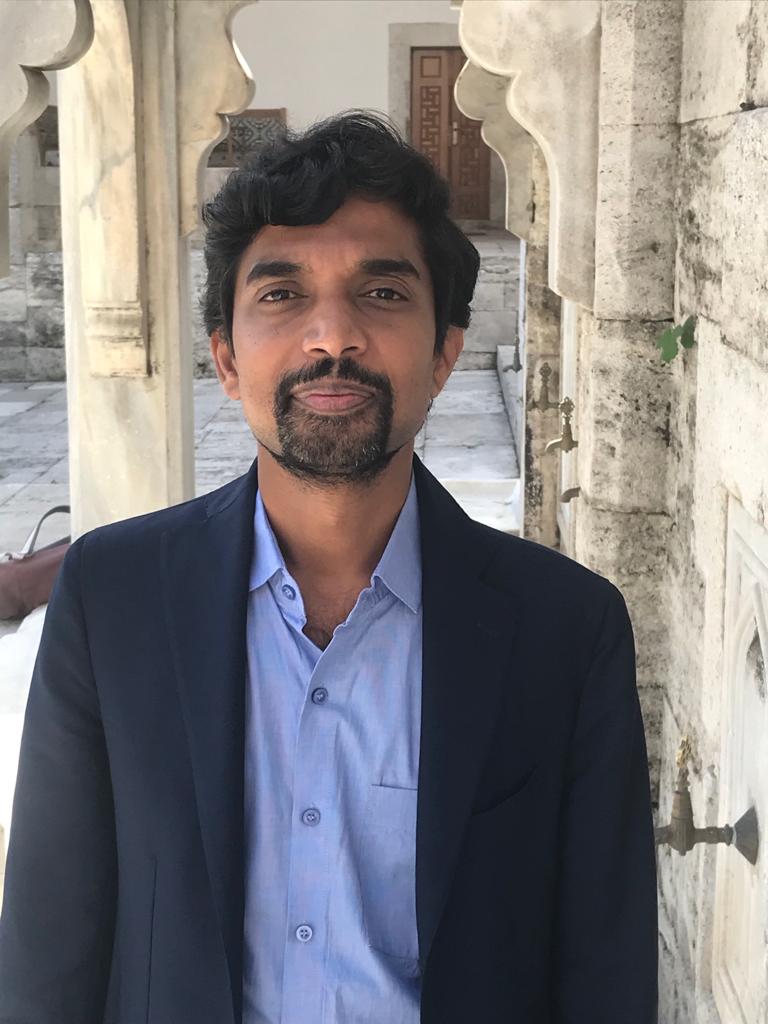Membres du CRH |
Membres statutaires
Naveen Kanalu Ramamurthy

Coordonnées professionnelles
EHESS-CRH
Ladéhis-GEHM (Bureau B 04-16)
54, boulevard Raspail
75006 Paris
0149542341
Présentation personnelle
Naveen Kanalu est un historien des normes et des pratiques juridiques, économiques et politiques de l’empire moghol (1526-1857) en Asie du Sud. Ses recherches qui portent sur l’histoire institutionnelle du droit hanéfite et ses modes de cohabitation avec le pouvoir s’articulent autour de trois axes : (1) grammaire administrative de l’espace impérial ; (2) normativité juridique et anthropologie historique ; (3) régulation de l’économie politique. Il mobilise des manuscrits arabes, des archives administratives, juridiques et fiscales et de la correspondance en persan (idiome officiel de l’empire) et dans les langues vernaculaires indiennes. Il propose ainsi d’étudier les institutions juridiques islamiques et de l’usage du droit contractuel hanéfite afin de situer les procédures administratives mogholes dans un espace trans-impérial de la circulation du savoir et du savoir-faire entre le Moyen-Orient, l’Asie centrale et l’Inde sur les temps longs (XIIe–XVIIIe siècles).
Il travaille actuellement sur un ouvrage consacré à la centralisation impériale à travers la codification du droit et son application quotidienne au travers des transactions bureaucratiques dans la seconde moitié du XVIIe siècle. Ses publications portent sur la dogmatique juridique hanéfite en Inde musulmane, les interprétations coloniales britanniques du droit et les représentations européennes des Moghols. Au-delà, il s’intéresse aux formes documentaires et aux pratiques de chancellerie islamiques, à la culture persanophone dans les contextes sociolinguistiques vernaculaires et à l’histoire intellectuelle arabo-musulmane dans l’Inde précoloniale.
- 2015-2021 : Doctorat en Histoire – Université de Californie à Los Angeles
- 2011-2013 : Master 2 Études iraniennes – Université Paris 3 Sorbonne Nouvelle
- 2011-2013 : Master 2 Histoire de la pensée économique – Université Paris 1 Panthéon-Sorbonne
- 2010-2011 : Master 2 Histoire et actualité de la philosophie – Université de Paris Ouest Nanterre
- 2007-2011 : Élève à l’École Normale Supérieure – Ulm, Sélection internationale
- 2003-2006 : Licence Sciences économiques – Université de Delhi
Chaire : Pour une histoire institutionnelle de l’empire moghol : Droit, pouvoir et économie politique en Asie du Sud (XVIIe–XVIIIe siècles)
Thèmes de recherches
- Empire moghol : souveraineté impériale et pouvoir, structures politiques et institutionnelles, administration et bureaucratie, chancelleries et pratiques documentaires.
- Histoire du droit/Études islamiques : dogmatique juridique hanéfite, culture manuscrite arabe, histoire intellectuelle arabo-musulmane en Inde prémoderne.
- Histoire économique : fiscalité et propriété foncière, activités commerciales et financières, systèmes monétaires précapitalistes.
- Histoire comparée : Asie musulmane de la première modernité, formations impériales prémodernes, sociétés persanophones et cultures vernaculaires en Inde précoloniale.
Enseignements 2023-2024
- Empires comparés. Juger et administrer dans les royautés ibériques, la Russie et l'Inde aux XVIIe et XVIIIe siècles
- La valeur en Islam : monnaie, dette et crédit (l’empire moghol et l’Inde)
- Séminaire de lecture : « Sur l'État », de Pierre Bourdieu
- Versions originales : les séminaires plurilingues de rentrée de l'EHESS
Publications
Articles dans des revues
- « La loi du droit non-écrit : La construction théorique-épistémologique de la coutume au XIXème siècle », Noesis, 34 (1), 2020, p. 193-215.
- « Reasoning the Procedures of Law-Making in Premodern India: Persian Idioms of Islamic Jurisprudence », Manuscript Studies : A Journal of the Schoenberg Institute for Manuscript Studies, 4 (1), 2019, p. 93-111.
- « Krishna Bharadwaj’s ‘Return to Classical Theory’: An Attempt towards an Archaeological Reconstruction », European Journal of the History of Economic Thought, 22 (5), 2015, p. 896-914.
- « Le Sāhasabhīmavijayam ou Gadāyuddham de Ranna : une adaptation du Mahābhārata dans la littérature de l’ancien kannada », Bulletin d’études indiennes, 28-29, 2010-2011, p. 63-84.
Contributions à des ouvrages collectifs
- « A Philosophical Critique of Manu’s Code: Confronting Hegel and Nietzsche on Indian Thought », dans Perry Myers et Pascale Rabault-Feuerhahn (éds.), The Intersection of India and Germany: A Transnational Survey Beyond Fascination, Londres, Palgrave, à paraître.
- « Historicizing the Limits of Sovereign Will: The Logic of Despotism and European Historical Images of Aurangzeb ‘Ālamgir », dans Vinay Lal (éd.), Colonial State and Forms of Knowledge: The British in India, New Delhi, Primus, 2022, p. 96-131.
- « The Pure Reason of Lex Scripta: Jurisprudential Philology and the Domain of Instituted Laws during Early British Colonial Rule in India (1770s–1820s) », dans Edward Cavanagh (éd.),Empires and Legal Thought: Ideas and Institutions from the Ancient World to the Modern World, Leyde, Brill, 2020, p. 462-491.
- « Pirla Panduga: Muharram practices of the Deccan Weavers, their Migrations, Songs and Memories », dans Vijaya Ramaswamy (éd.), Migrations in Medieval and Early Colonial India, Londres, Routledge, 2016, p. 129-164.
- « Darstellung matérialiste : le cinéma en tant que perception non-intentionnelle du réel chez Walter Benjamin », dans Marc Berdet et Thomas Ebke (éd.) Matérialisme anthropologique et matérialisme de la rencontre. Arpenter notre présent avec Walter Benjamin et Louis Althusser, Berlin, Xenomoi Verlag, 2014, p. 199-206.
---
Naveen Kanalu is a historian of the legal, political and economic institutions of the Mughal Empire (1526-1857) in early modern South Asia. He is currently working on a monograph that examines imperial centralization and the application of the Hanafi legal system to fiscal mechanisms, the monetary system, and bureaucratic procedures in the second half of the seventeenth century. His research brings together the study of Arabic legal treatises and documentary evidence and correspondence in Persian and Indian regional vernaculars to articulate the intertwined relation of Mughal legal practices to West and Central Asian Hanafism. Critically examining these divergent sources, his research aims to provide a textured understanding of Islamic legal institutions that shaped the Indian subcontinent’s precolonial past.
His articles on Hanafi jurisprudence in Indo-Islamic polities, British colonial interpretations of law, and European representations of Mughal rule have appeared in journals and edited volumes. More broadly, his research interests pertain to Islamic documentary forms and chancery practices, Persianate culture in vernacular socio-linguistic contexts, and Arabo-Islamic intellectual history in precolonial South Asia.
Associate Professor (Maître de conférences), EHESS
Chair: “The Institutional History of the Mughal Empire: Law, Power, and Political Economy in South Asia (17th-18th Centuries)”
Qualifications
- PhD in History – University of California, Los Angeles
- Masters Iranian Studies – Université Paris 3 Sorbonne Nouvelle
- Masters History of Economic Thought – Université Paris 1 Panthéon-Sorbonne
- Masters Philosophy – Université de Paris Ouest, Nanterre La Défense
- Ancien Élève, École Normale Supérieure – Ulm, Sélection internationale
- B.A. (Honours) Economics– University of Delhi
Research Interests
- Mughal Empire: Sovereignty and Power, Imperial Political and Institutional Structures, Bureaucracies and Administration, Chanceries and Documentary Forms
- Legal History/Islamic Studies: Hanafi Legal Doctrine and Jurisprudence, Arabic Manuscript Culture, Arabo-Islamic Intellectual History in Premodern India
- Economic History: Fiscality and Land Tenure Practices, Commercial and Financial Activities, Pre-capitalist Monetary Systems
- Comparative History: Early Modern Islamicate Asia, Premodern Imperial Formations, Persianate Societies, Vernacular Cultures of Precolonial South Asia
Research Seminars 2023-2024
-
La valeur en Islam : monnaie, dette et crédit (l’empire moghol et l’Inde)
-
Versions originales : les séminaires plurilingues de rentrée de l'EHESS
Publications
Articles in peer-reviewed journals
“La loi du droit non-écrit: La construction théorique-épistémologique de la coutume au XIXème siècle.” Noesis, Special issue on Philosophy of Customary Law 34, no. 1 (Spring 2020): 193–215.
“Reasoning the Procedures of Law-Making in Premodern India: Persian Idioms of Islamic Jurisprudence.” Manuscript Studies: A Journal of the Schoenberg Institute for Manuscript Studies 4, no. 1 (2019): 93–111.
“Krishna Bharadwaj’s ‘Return to Classical Theory’: An Attempt towards an Archaeological Reconstruction.” European Journal of the History of Economic Thought 22, no. 5 (October 2015): 896–914.
“Le Sāhasabhīmavijayam ou Gadāyuddham de Ranna: une adaptation du Mahābhārata dans la littérature de l’ancien kannada.” Bulletin d’études indiennes 28–29 (2010–2011): 63–84.
Articles in edited volumes
““Historicizing the Limits of Sovereign Will: The Logic of Despotism and European Historical Images of Aurangzeb ‘Ālamgir,” in Colonial State and Forms of Knowledge: The British in India, ed. Vinay Lal. New Delhi: Primus, 2021, 96–131.
“The Pure Reason of Lex Scripta: Jurisprudential Philology and the Domain of Instituted Laws during Early British Colonial Rule in India (1770s–1820s),” in Empires and Legal Thought: Ideas and Institutions from the Ancient World to the Modern World, ed. Edward Cavanagh. Leiden: Brill, 2020, 462–91.
“Pirla Panduga: Muharram practices of the Deccan Weavers, their Migrations, Songs and Memories,” in Migrations in Medieval and Early Colonial India, ed. Vijaya Ramaswamy. London: Routledge, 2016, 89–124.
 Actualités
Actualités
Quantifier la Shoah. Classer, compter, modéliser / Quantifying the Holocaust. Classifying, Counting, Modeling
 Colloque - Mardi 14 mai 2024 - 08:45L'élaboration et la discussion des techniques d'enquête et d'analyse quantitatives percutent et renouvellent de nombreux champs de la recherche historique. Comment cela affecte-t-il les études sur la Shoah ? Ce colloque, oragisé par Claire Zalc (CNRS IHMC, EHE (...)(...)
Colloque - Mardi 14 mai 2024 - 08:45L'élaboration et la discussion des techniques d'enquête et d'analyse quantitatives percutent et renouvellent de nombreux champs de la recherche historique. Comment cela affecte-t-il les études sur la Shoah ? Ce colloque, oragisé par Claire Zalc (CNRS IHMC, EHE (...)(...)
Pouvoirs de l’imagination. Approches historiques
 Journée(s) d'étude - Vendredi 3 mai 2024 - 09:15Séminaire EHESS/CNRS organisé par Elizabeth Claire (chargée de recherche au CNRS), Béatrice Delaurenti (maître de conférences à l’EHESS), Roberto Poma (maître de conférences à l’Université Paris Est-Créteil) et Koen Vermeir (chargé de recherche au (...)(...)
Journée(s) d'étude - Vendredi 3 mai 2024 - 09:15Séminaire EHESS/CNRS organisé par Elizabeth Claire (chargée de recherche au CNRS), Béatrice Delaurenti (maître de conférences à l’EHESS), Roberto Poma (maître de conférences à l’Université Paris Est-Créteil) et Koen Vermeir (chargé de recherche au (...)(...)
Les Lundis du CRH autour de l'ouvrage de Julia Cagé et Thomas Piketty : Une histoire du conflit politique.
 Débat - Lundi 6 mai 2024 - 14:00Qui vote pour qui et pourquoi ? Comment la structure sociale des électorats des différents courants politiques en France a-t-elle évolué de 1789 à 2022 ? En s’appuyant sur un travail inédit de numérisation des données électorales et socio-économiques des 36 000 c (...)(...)
Débat - Lundi 6 mai 2024 - 14:00Qui vote pour qui et pourquoi ? Comment la structure sociale des électorats des différents courants politiques en France a-t-elle évolué de 1789 à 2022 ? En s’appuyant sur un travail inédit de numérisation des données électorales et socio-économiques des 36 000 c (...)(...)
CRH (UMR 8558)
EHESS
54, boulevard Raspail
75006 Paris
Tél. : +33 (0)1 49 54 24 42
Direction du CRH :
Dernière modification :
15/04/2024


